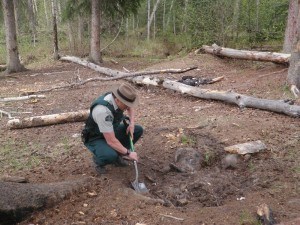Stories, tips & regulations with
Park Warden Joe Storms

In early April, we were on patrol, checking out a number of popular haunts outside the townsite, when I came across the unmistakable smell of smoke.
Immediately, I thought to myself, “someone is having a campfire. Hmmm, this is not a location where fires are permitted; there are definitely no fire boxes here.”
When I started looking around, I couldn’t see anybody, but the smell of smoke was getting stronger. I rounded the corner to a location that I’ve become quite familiar with and sure enough, I saw smoke coming from an illegal fire pit on the ground. I headed back to my truck, pulled out my shovel and returned to the site.
There was definitely no one around as I attempted to snuff the embers. It was then that I realized that this fire had entrenched itself and was burning under the surface of the forest floor. This fire was planning on sticking around for the long haul. And it’s only April!
By my estimates, with the activity around the area, this fire had been smouldering for a couple days. Did I mention it was April?
Here are some details to consider:
- The location of this site is only 400 meters from town.
- This fire had been smouldering underground for a couple days in April. What if it were August?
- What would happen if we had significant winds to fan the fire to life?
Illegal fires in Jasper National Park put residents, visitors, firefighters and facilities at unnecessary risk.
Approximately 50 per cent of wildfires in Jasper National Park are started by people. The causes of these human starts are most commonly illegal campfires.
The fires started by people are most likely to be located in or near highly populated areas.
The cost of putting even small fires out is often over $12,000, due to the need for helicopter use, and can be up to $50,000 per day. The residents of Canada pay for the response.
A fire built on the ground can burn down into organic material below the forest floor and keep burning after you think it’s out. Always use the provided park fire pits. It helps keep our community safe, and it’s the law.
It’s fishing season
Fishing in national parks is quite special and the activity dates back to the parks’ origins.
The first step to fishing in this beautiful, protected place, is to get a National Park Fishing Permit. These permits are valid in all national parks (your provincial permit is not transferrable).
Visitors and residents can purchase a one-day permit for $9.80, but the avid local fisherman will want to pick up the annual permit, valid from April 1 to March 31, for $34.30.
Permits are not transferrable, but children under the age of 16 can fish together with an adult under one permit. Take note, though, that catch totals fall under that single permit.
The necessity of a permit for fishing helps ensure that this outdoor experience remains available for all those who want to cast their rod. You wouldn’t want to get caught without one. Potential consequences for fishing without a valid fishing permit could include seizure of the prized fishing rod that your great uncle gave you for your eighth birthday, prohibition from having a permit for one year, and a trip to the courthouse.
All national park offences are automatic court appearances where, if convicted, the judge imposes a fine, and fines can range between $1 and $25,000 for a first offence.
National park offences can also be treated as minor or major offences, meaning a first offence can net upwards of $100,000.
Knowing where you are is critical to being in compliance with the law, as different areas have different seasons, some with special conditions, and some that remain closed to fishing. Check out local fishing regulations for this and other useful information on this outdoor experience.
When in doubt, go find out. The information centre is a good place to start, and of course the local tackle shop can also guide you. Also, park wardens are here to assist you. We are not just looking for bad guys.
For the Jasper National Park Fishing Regulations, go to: www.pc.gc.ca/jasper, visitor information, and then click on Brochures.
Alternatively, pick up your copy at one of the park information centres. These regulations help keep our aquatic life and their habitat healthy.
Help protect your park and park users by contacting the Warden Service to report a violation or situation you feel is not quite right. The 24-hour contact number is 780-852-6155, or toll free at 1-877-852-3100. Email them at [email protected].
Parks CanadaSpecial to the Fitzhugh
